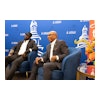Being a Visionary
It’s been a long time in the planning stages, but we finally caught up with Dr. Roderick Paige, U.S. Secretary of Education, in his office in Washington.
Interviewing the sitting secretary of education has become a Black Issues tradition. Our first such interview was with Secretary Terrel H. Bell during the first Reagan administration. With Paige being the first African American to hold the post, it seemed particularly fitting we feature him. But more important than his race or ethnicity is how the Bush administration’s education policies will affect our students. As one professor notes about Paige in the sidebar “Politics or Progress?” (see pg. 30), “…We want one of our own to succeed, but I hope we have moved beyond just being happy that he’s brown.”
Opinions vary on Secretary Paige and his track record. He has been referred to as “one of the greatest educators I’ve ever known.” He has also been accused of “stiffing education.” You be the judge.
Only time will tell whether the Bush-Paige policies will truly “Leave No Child Behind.”
In the “Race in the College Classroom” article, assistant editor for faculty affairs Kendra Hamilton, exposes one of higher education’s more closely held secrets. Many of you will be familiar with some of the trials and tribulations that the professors discuss in the article (see pg. 32). As we all know, campus environments often reflect the entire society. It should, therefore, come as no surprise that this vexing issue would surface in the classroom. Please e-mail or write to us with your own classroom experiences about this volatile issue.
Speaking of the classroom, I went back to the “classroom” recently to visit the NASA/Norfolk State University’s Pre-Service Teacher Conference in Alexandria, Va. Norfolk State’s School of Science and Technology, with funding from NASA, is working with minority college students who are interested in teaching on the elementary and secondary levels. NASA and NSU’s goal is to eliminate the science and math phobias that pre-service teachers might have so that once they go into the classroom they can teach in the areas of science, math and technology with enthusiasm and confidence. Hopefully the teachers’ enthusiasm will transfer to the younger students and spark an interest in the sciences.
Lastly, some of our future African American leaders met in Nashville, Tenn., last month at the first annual HBCU Think Tank. Approximately 400 college students gathered at Tennessee State University to discuss the role and future of historically Black colleges and universities. I’m encouraged that these college students, who haven’t yet graduated, are taking an active interest in making sure that HBCUs are around for generations to come.
The survival of HBCUs seems to be on the minds of many. Just recently I attended a church service where the visiting minister’s sermon focused on the survival of the nation’s minority-serving institutions. He was baffled that in the year 2002 when larger than ever segments of the African American community are doing so well some HBCUs are barely hanging on. Earlier generations of African Americans found the resources to support historically Black institutions with far fewer resources than the Black community has today. The key difference was that our forefathers had vision, he said. In closing, he posed this question to all of us: “What good is having monetary resources when you have no vision?”
Hilary Hurd
Editor
© Copyright 2005 by DiverseEducation.com



















